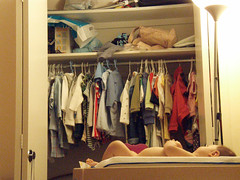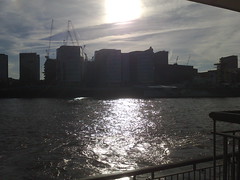
Re: Na zdraví

Re: Na zdraví

![]() photo credit: Daquella manera
photo credit: Daquella manera
Pokud přemýšlíte o tom, jak ozvláštnit své bydlení, naskýtá se několik možností. Od svěření svého problému do péče profesinálního architekta, přes koupi předpřipravených součástí bytu až po vlastní kreativní činnost s pilou a hoblíkem.
Podobná dilemata řeší lidé po celém světě a několik z nich o tom dokonce píše. Vřele doporučuju podívat se na tyto blogy:
Některé nápady mi přišly velmi zajímavé a originální. A to věci z IKEA opravdu moc nemusím..

![]() photo credit: Mr. Siegal
photo credit: Mr. Siegal
Původně jsme měli v době zahájení olympijských her sedět v letadle směr Hongkong a vyrazit na čtýřtýdenní cestu po Asii a východní Evropě. Krach dálkových low-costových aerolinek Oasis HongKong nám tyto plány překazil, a tak jsme alespoň využili již předem zakoupených letenek do Londýna a rozhodli se navštívit tuto metropoli.
Taken from the Russia Today webpage (original source):
Since the 18th century all of what is now Latvia, Estonia and most of Lithuania were part of the Russian Empire. Before the end of the First World War, the Empire had collapsed and in 1918 Riga, Vilnius and Tallinn proclaimed their independence, but this independence was short-lived.
In 1940, after a pact between Stalin and Hitler, the Baltic States entered the Soviet Union. Nazi forces pushed the Soviets back in 1941 but the Red Army returned in 1944 to make the countries part of the USSR once again. Its independence was reestablished only with the collapse of the Soviet Union.
So, despite the fact that in relation to Russia, Latvia calls itself a republic with a 90 year history, there are essentially no documented facts to prove this.
As historian Vladimir Simindey points out, “Russia recognized Latvia’s independence after the collapse of the USSR just like it did with all the other former Soviet republics“.
Even whilst taking into account current affirmations that Latvia retained its independence throughout the years of Moscow rule, on paper it officially held the status of a Soviet republic.
Since the collapse of the USSR Latvia, Estonia and Lithuania went from Communism to NATO and EU membership. Now, they are keen to break away from their Soviet past. The Museum of Occupation in Riga makes little difference between Nazi occupation during WW2 and Latvia’s years within the USSR and grudges over history continue to poison Latvia’s relations with Moscow.
A small introduction to Latvian language.
Latvian language belongs to the group of Baltic languages which developed directly from an old Indo-European language, thus it does not belong to Slavic or any other European language group. There are only two live languages nowadays – Latvian and Lithuanian, the rest of them have gone extinct. The first notable evidence is from the time around 10th century, however first known official source dates to 1530. The alphabet is Latin, with several specific letters which may remind of Western Slavic group (Czech, Slovak, Slovenian etc).
Recently the number of people having Latvian as mother tongue has reached 1,5 million in Latvia and 0,5 million abroad, some 0,5 million more have Latvian as second language – these people are of (mostly) Russian or other origin living in Latvia. Several primary school for minorities have been established, because from 1999 Latvian is the only official language in the country and students may study for free in public universities if only the education is given in Latvian. Ministry of Justice is running even a State Language Centre which supervises the use of the language in public areas or institutions.
Due to influence of German (from Prussian times, around 18th century) and Russian (after World War II) there is a visible reminiscence of these language in current Latvian, however there is a strong feeling for language purism. In 19th and 20th century several “updates” and “upgrades” for the language have been set and accepted, namely ortographic and grammar part. During the times under Russian rule (first the tsar, then Soviets) some groups proposed usage of Cyrilic alphabet, but this movement was not received positively.
Here are some examples:
Good evening! – Labvakar!
See you later! – Uz redzēšanos!
railway – dzelzceļš
4, 5, 6 – četri, pieci, seši
cafeteria – kafetērija or kafejnica
library – bibliotēka
office – birojs
swimming pool – baseins
bread – maize
chicken – vista
Links to read if you want to know more: Latvian language, Baltic languages, EN-LV dictionary.
Since my arrival to Riga the weather was the main topic of any conversation.
My questions concerned possible frozen sea during the winter, lowest January temperatures and common amount of snow in the city. Beginning of September was very sunny and I thought of nice trips into the countryside. However, things changed quite rapidly.
Everyday locals talk about terrible cold which is not common for this time of the year. I can handle low temperatures well, but I was not prepared for the fact that I will have the same cold air will be in our flat. The heating is not working yet as this is a decision of the government. Official news are that heating season starts if temperature does not rise above 8 C for three consecutive days. Usually this occasion comes in the second half of October. What surprised me more, local people are afraid of beginning of heating season. Reason? Prices were increased by 30% compared to last year.
Having cold flat is good for your fruit or vegetables because it has no possibility to rot in these conditions. The bad thing is that you become vegetable as well.
Today I wanted to buy a thermometer and start regular measurements. However, in 3 shops that I visited, there was no such thing as this. But I was told these things are available only through specialized shops, so I need to search more. Or perhaps go to outdoor shop and buy a sleeping bag..